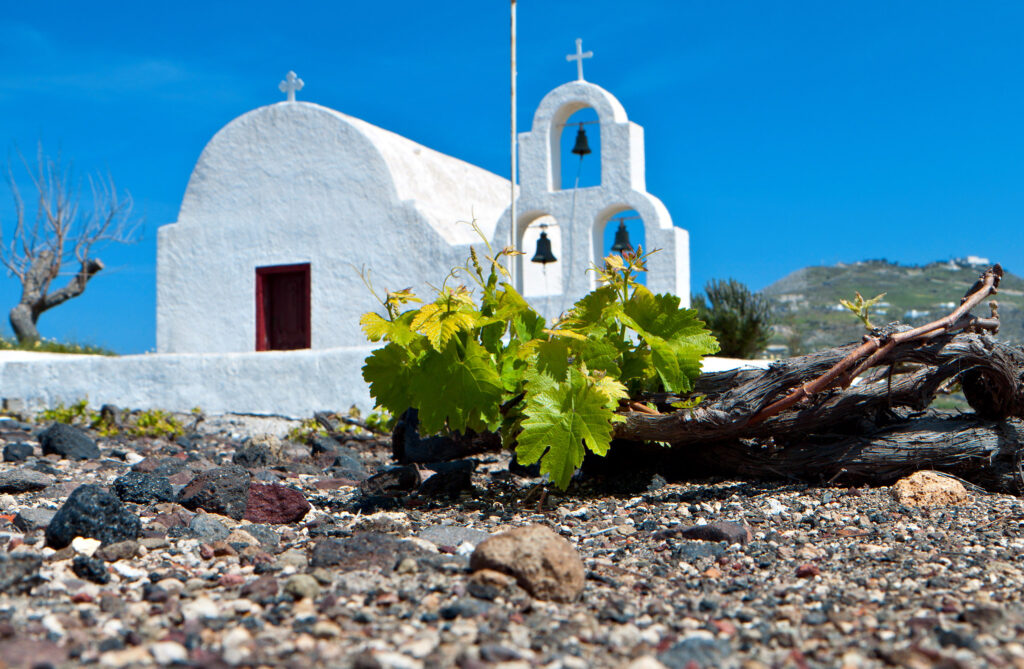The iconic vineyards of Santorini, renowned for their world-class Assyrtiko wines, are under threat, with winemakers warning that grape production could cease entirely by 2042 without urgent action.
Aging vines, climate change, a lack of young farmers, and uncontrolled urban development are pushing the island’s wine industry to the brink, prompting innovative efforts to save this cultural and economic treasure.
A Vineyard in Peril
Spanning 10,000 acres, Santorini’s vineyards are dominated by the Assyrtiko grape, which accounts for 80% of production and fuels the island’s Protected Designation of Origin (PDO) wines. These wines have earned global acclaim, but the primary sector underpinning this success is faltering. “The situation looks grim, but we remain optimistic and will fight for our vineyard’s survival,” says Petros Vamvakousis, president of the Santorini Winemakers’ Association, in an interview with Oikonomikos Tachydromos (OT).
Vamvakousis highlights a troubling trio of challenges: aging vineyards, with plants averaging 60–70 years old and past their productive peak, leading to low yields; climate change, marked by dwindling rainfall; and a shortage of young farmers, as the industry struggles to attract new talent. “We haven’t managed to inspire the next generation to pursue this profession,” he notes, suggesting initiatives like scholarships or a local viticulture school to leverage Santorini’s prestigious Assyrtiko heritage.
Climate Change and Water Scarcity
Water scarcity is a critical concern. “Without water, we have no future,” Vamvakousis warns. Mathematical models predict a collapse in grape production by 2042, while broader studies suggest that by 2060, Mediterranean coastal regions could see drastic changes in flora, threatening not just Santorini’s vines but many crops in areas at risk of desertification. The Santorini Winemakers’ Association, formed in 2023 with 10 of the island’s 18 wineries, is collaborating with universities and research institutes to apply new technologies and reverse this trend.
Innovative Solutions in the Works
The Association has launched a dedicated “SOS for Water” task force to address the crisis. One ambitious project involves treating wastewater from biological purification systems for use in vineyards, a practice already implemented in countries like Spain for over two decades. In partnership with the Aristotle University of Thessaloniki and local water authorities, the initiative aims to develop a methodology for redistributing treated water to vines during winter, preserving the island’s traditional dry-farming techniques.
Another groundbreaking effort involves a device that captures atmospheric humidity and converts it into water without energy consumption. Originally developed for the U.S. military to sustain soldiers in deserts, the technology is being scaled up in collaboration with a U.S. innovation firm to meet Santorini’s needs. Additionally, discussions with regional water authorities are exploring the potential to filter brackish water from existing boreholes for irrigation.
Balancing Development and Preservation
Uncontrolled construction on Santorini exacerbates the crisis, encroaching on agricultural land. A recent urban planning study suggests there is still space for both development and vineyards, but Vamvakousis criticises the state’s inaction in providing concrete solutions. “We need measures to protect our fields and vines,” he urges.
A Call to Action
Santorini’s winemakers are determined to preserve their legacy, blending tradition with innovation to safeguard an industry that is both a cultural cornerstone and a global ambassador for Greek wine. As the clock ticks toward 2042, their efforts underscore the urgency of collective action to ensure the island’s vineyards continue to thrive.
(Source: To Vima)

